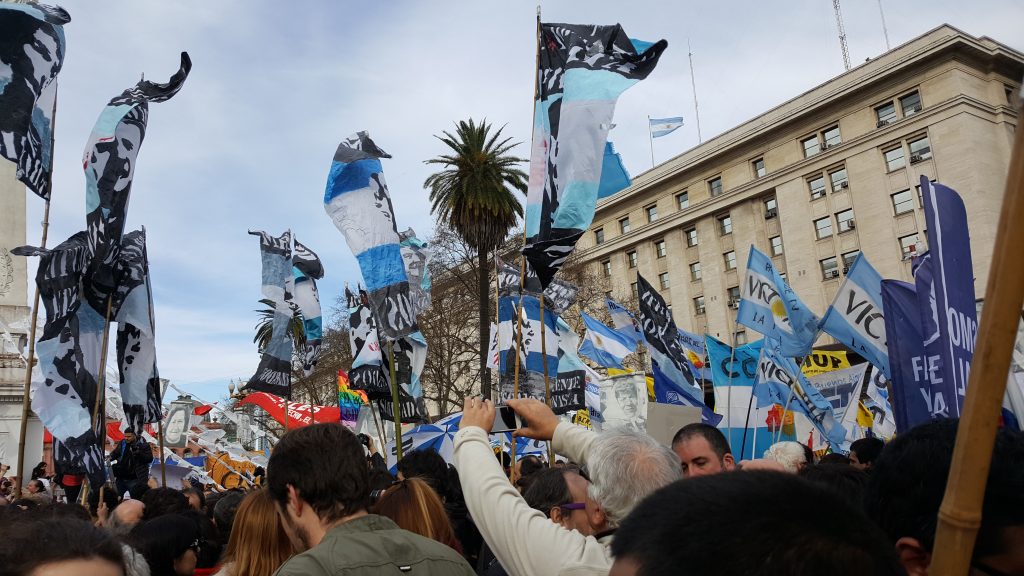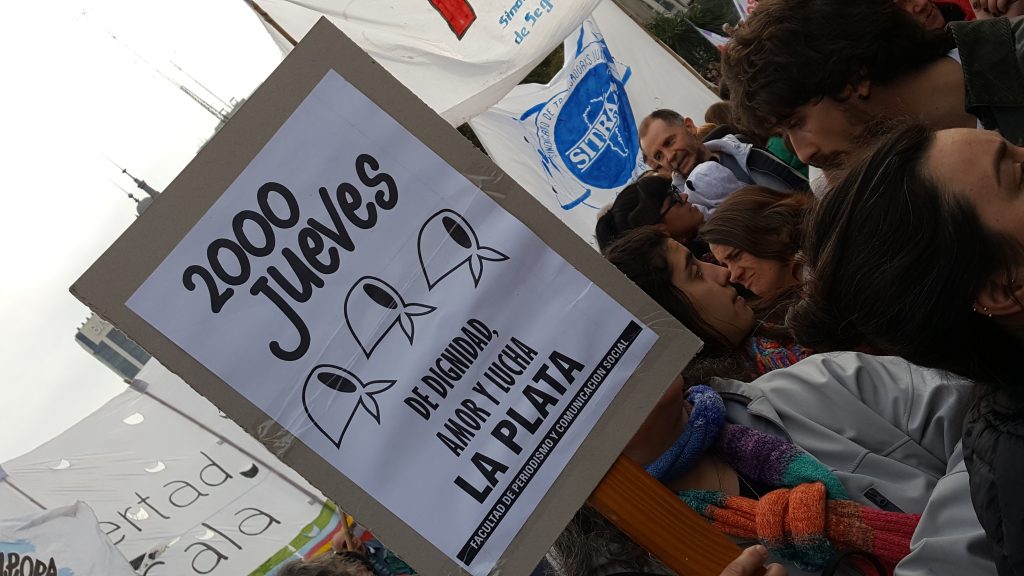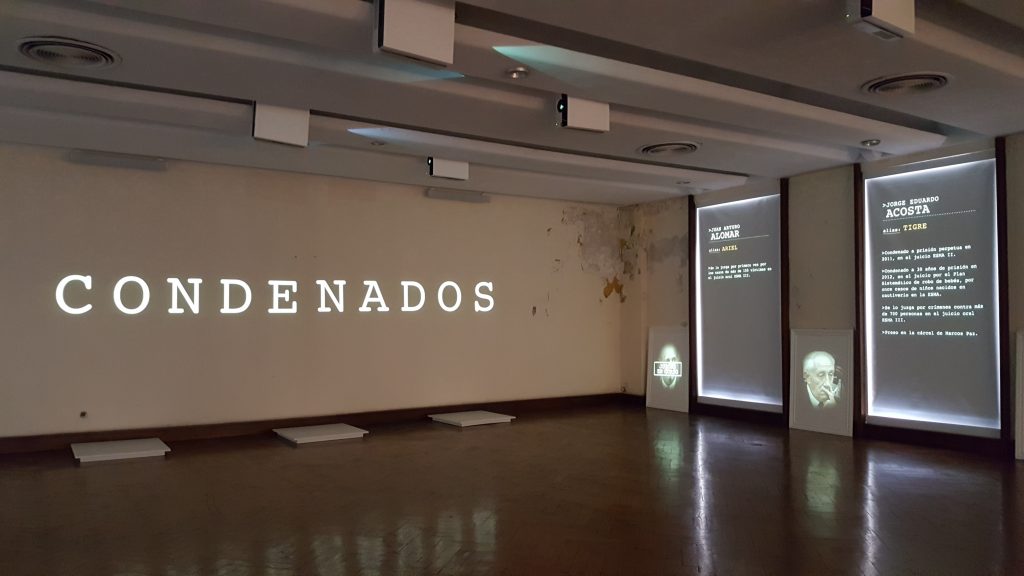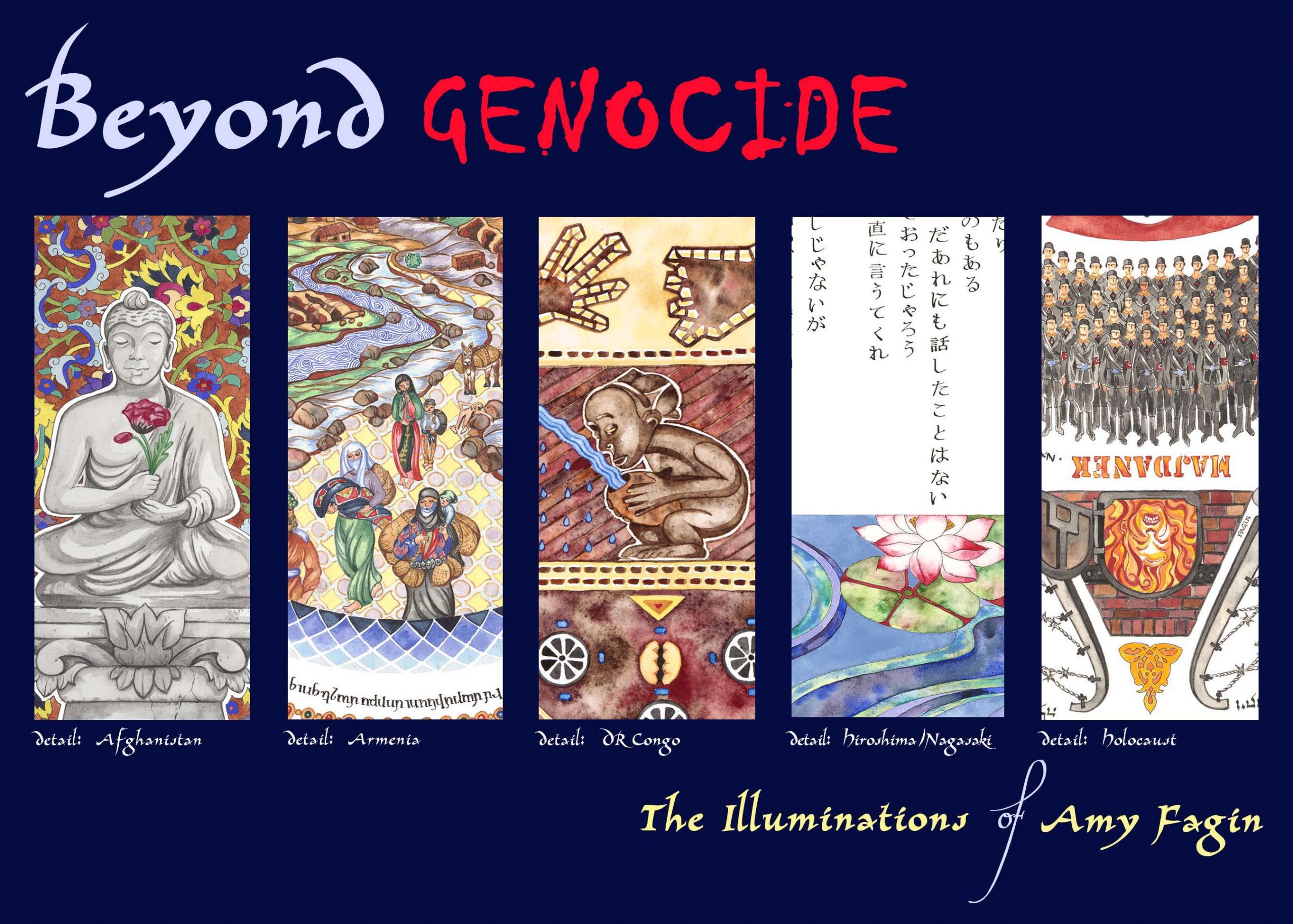2000th March of the Madres de la Plaza de Mayo
Written by Amy Fagin

2016 marks a milestone anniversary year for Argentina. 40 years ago this country was thrust into a period of state organized extreme violence precipitated by a “golpe de Estado”on March 24th punctuated by kidnappings, mass arrests, torture, and murder and operation of over 600 clandestine detention centers. An estimated 30 thousand citizens were summarily executed, assassinated or “disappeared” during this military dictatorship until its collapse in 1983. The official name for the state driven terror was “Proceso de Reorganizacion Nacional”
(National Reorganization Process) which euphemistically belies the fear instilled nation wide by the military junta lead by Lieut.Gen .Jorge Rafael Videla.
The term “Dirty War” is widely used internationally to describe this era, but on Argentinian streets conversations reveal a consternation with this vernacular. The lexicon insinuates, they will tell you, that systematic authoritarian repression and mass murder is justified by the notion of civil “war” and validates government actions for those years better defined as state driven terrorism.
This past March 24th, now marked as an annual day of “Remembrance for Truth and Justice”, U.S. president Barack Obama visited Argentina attending a commemorative ceremony with Argentina’s recently elected president Mauricio Macri at Parque de la Memoria. Conciliatory words by Obama did not appease the icons of Argentine justice: Las Madres de la Plaza de Mayo, who reminded the global community of the classified intimacies that the US government provided by backing this military junta. Obama promised to release military and intelligence papers after his term of office. Perhaps a shift in international dialectics for this era in Argentine history more accurately described on Argentinian soil as an era of “State Terrorism” will take root.
I struggle to exact a concise “lexicon” for this brief article upon return from the travel seminar “Modernization, Mass Atrocity and Memorialization” to share “new vocabulary” with the genocide studies community. Our tour encompassed three major cities specifically to visit prominent ex-clandestine detention centers now operating as public memory sites, to interview representatives of institutions working with public memory initiatives, archiving and documentation of state crimes, education and legal proceedings on behalf of the victims of this era of state criminality. The goals for this visit to broaden an understanding of the influence of global popular initiatives dedicated to insuring truth, insuring justice, and insuring memory were well served.
For these processes are the language of democracy.
Less than a week before our arrival in Buenos Aires 87 year old “Madre” Hebe de Bonafini was ordered under arrest. Bonafini, one of the founders of the Mother’s of the Plaza de Mayo, defied a court order to give evidence regarding embezzlement in a case (she is not personally under accusation for).
This political development set the stage for our scholar’s tour.

Thursday, August 11th, the day after our arrival the 2000th march of Las Madres de la Plaza de Mayo was underway. Thousands of marchers were boisterously celebrating this 40 year milestone of unrelenting civil resistance and popular mobilization on behalf of representative democracy.
Their influence has helped to shape democratic processes in Argentina.

Main hall of E.S.M.A. in the former “Casino de Oficiales” which functioned as a central clandestine detention center in Buenos Aires. As many as 5000 men and women were detained here, many of whom were “disappeared”; thrown alive into the Atlantic Ocean currents.
Today E.S.M.A. is a public “Sitio de Memoria” providing a plethora of cultural and educational initiatives for truth, justice and memory.
In addition to visiting E.S.M.A. and Parque de la Memoria in Buenos Aires we met with the capable staff of Memoria Abierta, a foundational consortium of human rights organizations operating in the ESMA complex and journeyed to the memory site known as El Ex Olimpo. This institution is a dignified memory site and former clandestine detention center, operating outside of the city center. Here an awareness of this site once operating as a secret prison is visceral. The life histories of each of the “disappeared” who were detained here are remembered personally as neighbors and relatives. Though this site primarily serves a domestic audience its very regional dimension conveys a physical force of the unit as a detention center as well as the weight of its responsibility now, as a memory center.
We spent one morning at the studio of noted artist / activist Marcelo Brodsky whose iconic publication “Buena memoria” internationalized the plight of Argentinian families and their personal tragedies and terrors woven into the fabric of daily life under military dictatorship.
Our journey took us to Rosario to the first Museo de la Memoria established in the country, and then to Cordoba to witness the tireless work of the “Comision y Archivo Provincial de la Memoria de Cordoba”. This center provides invaluable services enforcing the legislative enactment known as the “Memory Act” (9286 Act) in 2006. Located in “D2”, a former detention center and the Police Intelligence Department of Cordoba, D2 is now a public memory space. The activities of this organization are truly remarkable and cover a wide array of activities in the areas of investigation; education; law; preservation and a myriad of civic and cultural memory initiatives. The “Comision” also maintains two other central former detention centers La Perla and Campo de La Ribera.
The histories of which house the day to day stories of a people paralyzed and terrorized by an imposed authoritarian “junta” diabolically re-defined as “government”.
Tomorrow, the 25th of August the Dia de la Sentencia arrives in Cordoba where the “Mega Causa” trials against state terrorism completes its hearings. Summons and sentencing are set for 11:00am.
The lexicon of democracy in Argentina begins with a capital “D”.
For more information about future travel seminars contact Amy at info@beyondgenocide.net or visit Beyond Genocide Centre for Prevention
